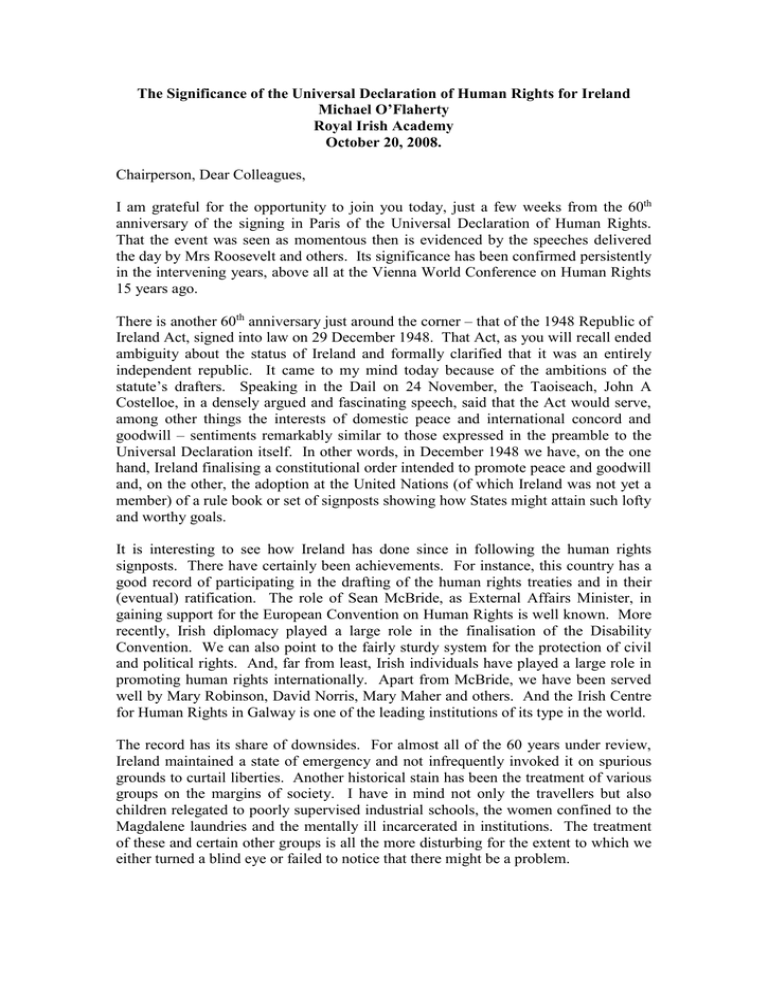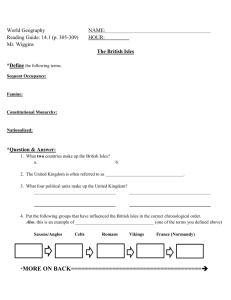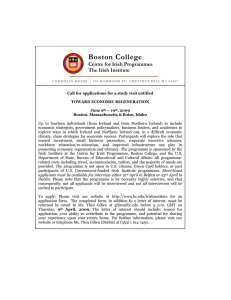The Significance of the Universal Declaration of Human Rights for... Michael O’Flaherty Royal Irish Academy
advertisement

The Significance of the Universal Declaration of Human Rights for Ireland Michael O’Flaherty Royal Irish Academy October 20, 2008. Chairperson, Dear Colleagues, I am grateful for the opportunity to join you today, just a few weeks from the 60th anniversary of the signing in Paris of the Universal Declaration of Human Rights. That the event was seen as momentous then is evidenced by the speeches delivered the day by Mrs Roosevelt and others. Its significance has been confirmed persistently in the intervening years, above all at the Vienna World Conference on Human Rights 15 years ago. There is another 60th anniversary just around the corner – that of the 1948 Republic of Ireland Act, signed into law on 29 December 1948. That Act, as you will recall ended ambiguity about the status of Ireland and formally clarified that it was an entirely independent republic. It came to my mind today because of the ambitions of the statute’s drafters. Speaking in the Dail on 24 November, the Taoiseach, John A Costelloe, in a densely argued and fascinating speech, said that the Act would serve, among other things the interests of domestic peace and international concord and goodwill – sentiments remarkably similar to those expressed in the preamble to the Universal Declaration itself. In other words, in December 1948 we have, on the one hand, Ireland finalising a constitutional order intended to promote peace and goodwill and, on the other, the adoption at the United Nations (of which Ireland was not yet a member) of a rule book or set of signposts showing how States might attain such lofty and worthy goals. It is interesting to see how Ireland has done since in following the human rights signposts. There have certainly been achievements. For instance, this country has a good record of participating in the drafting of the human rights treaties and in their (eventual) ratification. The role of Sean McBride, as External Affairs Minister, in gaining support for the European Convention on Human Rights is well known. More recently, Irish diplomacy played a large role in the finalisation of the Disability Convention. We can also point to the fairly sturdy system for the protection of civil and political rights. And, far from least, Irish individuals have played a large role in promoting human rights internationally. Apart from McBride, we have been served well by Mary Robinson, David Norris, Mary Maher and others. And the Irish Centre for Human Rights in Galway is one of the leading institutions of its type in the world. The record has its share of downsides. For almost all of the 60 years under review, Ireland maintained a state of emergency and not infrequently invoked it on spurious grounds to curtail liberties. Another historical stain has been the treatment of various groups on the margins of society. I have in mind not only the travellers but also children relegated to poorly supervised industrial schools, the women confined to the Magdalene laundries and the mentally ill incarcerated in institutions. The treatment of these and certain other groups is all the more disturbing for the extent to which we either turned a blind eye or failed to notice that there might be a problem. Many challenges continue – some familiar – such as gender discrimination and prejudice against travellers. Others are new, including the tendencies towards racism and xenophobia. At the institutional level we still face the dualism of the Irish legal system – whereby treaties are not automatically incorporated into domestic law by the act of ratification – an approach that simply makes no sense when it comes to human rights treaties. Another negative aspect of the Irish legal system is its anachronistic unwillingness to employ human rights argumentation in the courts. And the single most important institutional initiative for human rights protection - the Human Rights Commission –instead of receiving the additional resources it so badly needs is actually under threat Faced by such problems we can ask legitimately, what went wrong? How could a state that is committed to the goals of the Universal Declaration have gone astray? I recently came across an article that provides some elements of an answer. It concerns itself with the role of paradigms in governance – of those big organisational intellectual frameworks that underlie all the actions of the state. It argues that Ireland has been badly hobbled by its paradigm. Sean Healy and Brigid Reynolds of CORI Justice argue convincingly that the State has operated under a mechanistic, technocratic and sexist model since its inception and that this has veered it away from addressing the needs of the weakest in society and to disregard the social aspects of human development. Having diagnosed the problem, Healy and Reynolds then propose a solution – a change in paradigm. They propose a new model that has at its core a set of values to do with solidarity, community and concern for the most vulnerable. Their approach is interesting since it does not take a great jump from their arguments to suggest that what is needed is actually a governance paradigm that is based on human rights – in other words, where human rights are not just a set of distinct regulations but are also the source for the big ideas of governance that underlie all its actions. Perhaps that is the solution we need for Ireland. A radical re-visioning of the role of human rights at the heart of policy and decision making. On this 60th anniversary of the UDHR and of the Republic it is timely to reflect on what the adoption of such a paradigm might mean in practice and how it could make a difference. We can at least get a flavour of it today by looking at some of the fundamental principals of UDHR and the systemic impact they might have. The first of those principles is that of human dignity. Human rights derive from the humanity of each person and are only served when the human is considered as an honoured and autonomous subject. The whole system of human rights treaties obtains its legitimacy from this proposition. The foundational status of human dignity carries with it a remarkable number of practical implications, including at the national level. For instance, we derive from it a human rights entitlement to participation, whereby each person is entitled to engage actively in whatever processes and decisions affect his or her welfare. This has obvious implications for all levels of governance. It demands a reasonable degree of localised decision-making and accountability and challenges tendencies towards an over-centralized State. It also requires that a society give its people the time ands space to be involved in public life – something this is under threat in a culture of extended working hours and where housing policy forces increasingly long commutes. Another implication of the principle is that people must be educated about their human rights (something that is specifically mentioned in the Universal Declaration) since they are hardly likely to demand their own rights or participate effectively if they do not have a sense of their own entitlements. You might imagine that this, at least, is one area where the State is rising to the challenge. Not so. This country, like most others, has barely tapped the potential of human rights education for children and adults. The second principle is universality. Universality is the recognition that all peoples equally hold all human rights. It underlies every aspect of non-discrimination. It also demands a response that is sometimes overlooked – that is the response that exhausts every effort to identify where the principal is falling down in practice – that seeks out the most marginalised, the most vulnerable for priority attention. It means that the most fundamental test of our commitment to human rights is the vigour of our commitment to the weakest members of society - that the people most on the margins of our society must consistently be the first priority of the State. And there is one axiomatic fact – the more vulnerable and marginalised a group, the least likely its human rights entitlements are to grab our attention. This correlation of need and invisibility is all too obvious in Ireland as we have seen from some of the examples I cited earlier. What would it mean in practice if universality were an element of the state’s paradigm? It would, for instance, put the problem of poverty at the heart of the government’s concern. Poverty in Ireland is a startlingly large, neglected and growing vulnerability. EU figures of this year indicate a 16% level of poverty within the population of the European Union, with that figure rising to 20% percent for those over the age of 65. Here in Ireland, 17% of the population live on incomes below Euro 11,400 a year for a single person and Euro 26,400 for a household of four. The situation is sure to worsen as the economic downturn intensifies. The human rights paradigm would not only bring poverty to the fore, it would also give a distinct shape to the state’s responses. It would affirm that poverty can only be overcome by means that integrate attention to all of the economic, social, civil and political aspects of the situation. In other words, while we certainly need to give particular attention to shelter, health care, and social welfare rights, we cannot overlook the need to achieve the civil and political empowerment of the poor. Some of you will be aware of how these ideas have been developed and clarified in the framework of what is described as the rights-based approach to development. Much of that effort has concentrated on less developed countries, however it is relevant everywhere. Here in Ireland the right-based approach has been the subject of an important and valuable multi-year project of the Irish section of Amnesty International. And of course the complex multi-faceted nature of the rights-based approach demonstrates the third principle of the Universal Declaration that I wish to highlight today, the indivisibility of human rights – the inexorable interdependence of all human rights regardless of their hue. Here again we have an idea that has explosive potential in a country that constitutionally and otherwise maintains a hierarchy of civil and political over economic and social rights and where there is some political resistance to the idea of economic entitlements. The last principle for me to refer to is not really one at all. Instead it is a quality of the Universal Declaration that is central to its significance. This is the wide public assent that has underlain the human rights movement for much of its existence. The Universal Declaration was acclaimed and repeatedly reaffirmed by the international community. It supported the development of a network of treaties that have the support of most States. It is in the basis of these levels of assent that we can envisage human rights taking the role of national paradigm. I need to refer to it today simply because it is under grave threat – it is no hyperbole to suggest that the assent is unravelling before our eyes. Governments and communities are challenging the fundamentals and either rejecting or seeking to dilute the rights themselves. These negative trends take many forms. At their most extreme there is a wilful disregard for human life and dignity. Fortunately that is rarer than is sometimes assumed. Far more pervasive is puzzlement about the role of human rights, a failure to accept that it is an effective tool for human betterment. Sometimes, even, there is a genuine fear that the human rights agenda will undermine social progress and community wellbeing. I am sure that many of you will recognise such viewpoints. Certainly I am confronted with them daily – both in the classroom and in my advocacy work (my most recent and bruising experience has been triggered by my work on Yogyakarta Principles – the statement on the application of human rights law regarding sexual orientation and gender identity). These developments have to be challenged if the human rights system is to survive and to offer a framework for society and for governance. This will demand action at many levels. For instance, it requires human rights advocates to relate their work to the existing international standards, rather than to subjective ideas of right and wrong. Most important of all, it requires a respectful dialogue with the disparagers in order to seek common ground. Both the gravity of the problem and the possibilities for action are well illustrated when one considers the relationship of human rights and some faith communities. Among the most trenchant of contemporary criticisms of human rights come from religiously inspired commentators. The persistence and the volume of the criticism is a cause of real worry when one considers the profoundly religious environments that characterise mush of the world. Obviously Ireland is as implicated as any other country, not only on the basis of the religiosity of a significant proportion of its established population but also taking account of patterns of immigration and migration. As for possibilities for action, there is great value in recalling again and again the role of religious inspiration behind the corpus of international human rights law as well as the extent to which it reflects the values and the teachings of the great faiths. Consider, for instance, the extent of overlap between Roman Catholic social teaching and international economic and social rights, as well as the relationship of asylum law with basic tenets of Islam on hospitality for the stranger. I hope that an appropriate Irish institution will encourage and facilitate these debates those with the faith communities as well as the others that time does not permit me to discuss today. Perhaps the Irish Human Rights Commission could take up the issue – maybe in tandem with the necessary academic research. Together, Irish institutions can create and support the sorts of respectful spaces in which the commonalities can be found and human rights can be permitted to thrive side by side with diverse belief systems and visions of society. Dear Friends, We were given a broad canvass for our remarks today. I have tried to concentrate my own contribution on the possibilities for a fresh approach – to release the Universal Declaration and the related legal standards from the corner to which they have been relegated – to let the spirit of the Declaration reorient our society – or at least its governance. I hope that my thoughts on the principles of dignity, universality and indivisibility have at least suggested what the impact might be if Ireland were to embrace this human rights paradigm. I hope also that you might share my concern that this development can only be on the basis of a wide public support that cannot be taken for granted. I am not proposing a miracle cure and am not hopelessly naïve – even if the public will was with the idea I do appreciate that the adoption of a new policy approach is no panacea – if we were to gather again some years after embarking on that experiment we would still face a legion of challenges. What would be different would be the context. Unlike now we would have the culture, tools and capacities to respond in an effective way. It is no exaggeration to suggest that we would, for the first time and at last, have a state capable and willing to strive seriously for those goals expressed by Taoiseach Costelloe in that 1948 speech – peace, concord and goodwill. Thank you.






